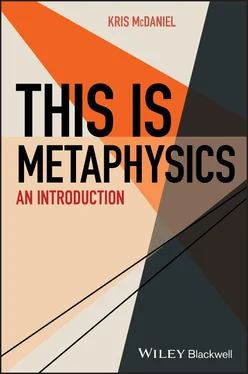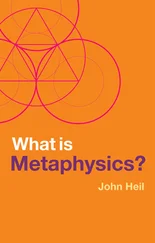0.28 Metaphysics addresses questions that cannot be fully answered by empirical scientific investigation alone. This does not mean that empirical scientific investigation is never relevant to any metaphysical question. On the contrary, it frequently is. But empirical scientific investigation alone can’t fully answer metaphysical questions. Among the questions that metaphysics addresses are:
Do we have free will?
What is the nature of human persons—are we purely physical beings or do we have a non‐physical part or aspect?
How is time different from space?
Is everything a particular or are there universals?
What is the nature of possibility and necessity?
Many of these questions will be discussed at length in the chapters to follow. For some of these questions, the connections to empirical science will be more obvious—such as the question of how time is different from space. For other questions, the connections will be less obvious. The metaphysician should not dogmatically assert that empirical science can shed no light on metaphysical questions. But it is also an equally open question whether empirical science always can. I recommend a “wait and see” attitude towards this question as you read through the book.
0.29 Time for some more subfields, so that you can get a clear sense of what philosophy is about and how metaphysics fits in with the rest of philosophy. Every aspect of our lives can generate philosophical questions, and this is why there exist the subfields of philosophy I am calling philosophies of X , such as the philosophy of religion, philosophy of science, philosophy of language, philosophy of sports, feminist philosophy, philosophy of art, and so on. Each of these subfields is unified by its focus on a particular X—but each of these subfields also overlaps in various interesting ways with epistemology, logic, ethics, and metaphysics. Consider, for example, one of the central questions in the philosophy of religion: Is there a God? This central question is also an important question in metaphysics, though it won’t be addressed in this book. Now consider the question of whether the testimony from various holy texts provides evidence for the existence of God. This is an important question in the philosophy of religion, but it also clearly connects with an important question in epistemology, namely, whether testimony provides good evidence for beliefs. Finally, consider the question of whether we have a moral obligation to worship God, provided that such a being exists. This is an important question in the philosophy of religion, but it is also a question that ethicists might ponder. Similar observations can be made about each of the various philosophies of X. The subfields of philosophy are not cleanly separated. Rather, in philosophy, every question leads to further questions.
0.30 Finally, there is the history of philosophy, which is devoted to the study of the history of various philosophers, their arguments, their views, and so on. There is an interesting philosophical question about the relation of the history of philosophy to the rest of philosophy: not many academic disciplines incorporate the study of the history of their discipline into their core curriculum. How relevant is the history of mathematics or the history of biology to the research of contemporary mathematicians or biologists? On the face of it, it is not very relevant at all, which is probably why there are few such classes taught in mathematics or biology departments, and, even when they are taught, they are rarely classes that one must take in order to complete one’s degree in that major. Yet in most departments in North America, not only is the history of philosophy taught but typically several classes in the history of philosophy are required in order to complete a philosophy major. Does this difference suggest that the history of philosophy is important to contemporary research in philosophy?
0.31 This is a hard question, I think. But regardless of what the correct answer to this question is, this will be a book focused on contemporary metaphysics, which means we will engage in very little historical reflection in what follows. Occasionally though, I will mention important figures in the history of philosophy when their views or arguments are relevant to the contemporary material I am discussing.
0.32 Hopefully this brief overview of the various subfields of philosophy and their relations to metaphysics will be useful for what follows. As I mentioned earlier, I’m going to do my best to make the journey as smooth as possible, but since philosophy is inherently tricky, you should expect to hit the occasional roadblock. You should also be prepared to never finish the journey: metaphysics rarely delivers definitive answers to the questions it asks. I do not expect to teach you the answer to any given metaphysical question, although I believe that there usually is a correct answer. Rather, what I hope to do is to teach you how to think carefully about metaphysical questions, and how to reason through arguments for metaphysical conclusions. Once you know what metaphysics is and how metaphysical inquiry is conducted, you are all set to do metaphysics on your own.
0.33 And this is important since metaphysical questions can be found anywhere. Here is an example that illustrates how quickly you can find oneself facing a metaphysical question, at least once you have been trained to see them. Suppose you are trying to decide on whether to invest in a soda pop company or in a computer company. Part of what you do when making this sort of decision is you ask yourself what would happen were you to select some course of action out of the options available to you. You think to yourself thoughts like, “If I were to do this, then that would happen, but if I were to do this other thing, then that other thing would happen.” In short, you contemplate what philosophers call counterfactuals , which are claims about what would happen if something else were to happen. And you are going to successfully deliberate about what to do only if you have some reason to think that these counterfactuals can be true. But now for the metaphysical question: What makes a counterfactual true? (We’ll have more to say about this question in Section 4.4.)
0.34 In general, metaphysical questions are lurking behind pretty much every corner. Having some insight into how to think about them might be a skill worth picking up. One of my goals is to help you develop that skill.
0.35 Although the title of the book is This Is Metaphysics , I don’t cover every topic that is discussed by metaphysicians. As I said a moment ago, metaphysical questions lurk behind every corner, and so it is unlikely that any book would cover every topic. Still, I want to be clear that there are important topics that metaphysicians do talk about that are not discussed in this book. My main reason for not discussing them is just that the goal of this book is not to cover every topic in metaphysics—if this were the goal, maybe the book would be titled This Is All of the Metaphysics —but rather to introduce you to the activity of doing metaphysics. An omission of these topics is not an admission of their unimportance. If, by working through this book, you develop the skills needed for thinking about metaphysics, you will be well prepared to think hard about these other topics as well.
0.4 Remarks for Instructors
0.36 As the section title indicates, I’ll briefly say some things to instructors who are considering whether and how to use this book in their classes. Given how I’ve pitched the book, I believe that it can be used in introductory philosophy classes, either as the sole text or as a text that you use along with others. It would also be useful as a text in an upper‐division metaphysics class, especially if it is coupled with contemporary articles that go into more depth or present contrasting points of view.
Читать дальше












